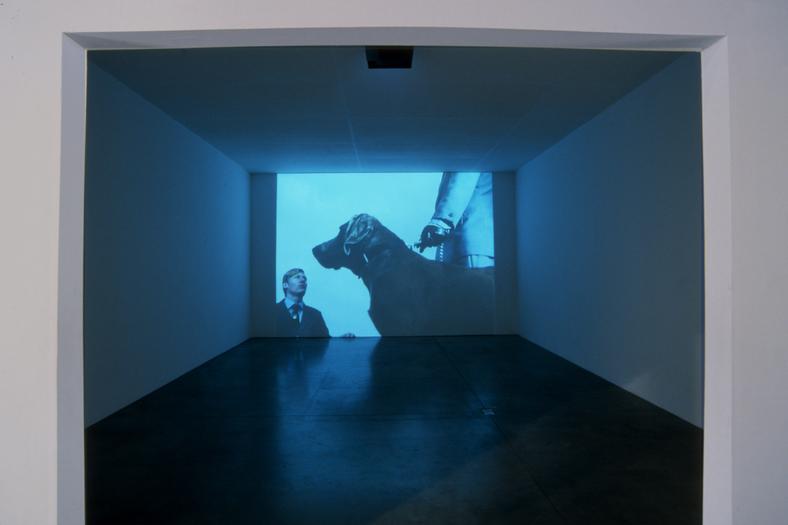Annika Larsson
February 15 – March 23, 2002
Main Gallery
We are very excited to announce Annika Larsson's first solo exhibition in the United States: a show of two video works; Dog, 2001 and POLIISI, 2001. Every image in Annika Larsson's videos is explicit and sharp as is the specific choice of actors, costumes, music (Tobias Bernstrup composed the music for both videos), and props. There appears to be a sense of overt obsession and clarity. There are no accidents. Larsson shoots, directs and edits all of her videos personally and her interest in small details, such as movement, gesture and gaze is very clear, as is the awareness of purpose and consequence.
Dog depicts an act of loyalty and commitment taking place between two male subjects/counterparts yet they seemingly lack a specific goal. This emptiness, or vacuum, stands in contrast to the heroic signs created by the music and casting. These "heroes of nothing" move in a void. Seduction is strongly present throughout the work and the dog, reduced to an object, serves to channel the emotions between the two men. Props and costumes such as the heavy chain and substantial collar on the dog and the men's well-pressed business suits reinforce the very serious and measured precision in the video. This excessive tension serves to make the erotic undertones even more perverse.
POLIISI, shot at night in the monumental surroundings of the Senate Square in Helsinki, the background, a large cathedral, in some images a glimpse of the statue of Alexander II. This video revolves around four characters; three men dressed as riot policemen wearing helmets, protection vests, shin-guards and batons, and a jockey-like character dressed in riding boots, a yellow bomber-jacket and knee-pads. The impetus for the video was Larsson's observation of the huge shin guards worn by the Paris riot police and she found herself beginning to seek out source material that contained news images of riot fights. What started as an obsession with the material component became altered through the lens of social consciousness and our heightened public psyche while simultaneously mutating as fetish. A lone and primarily unconscious victim characterizes the "demonstration" or "crowd" and because of his singularity and passivity, in stature, state, and attire, the confrontation of the protest is removed.
Recently on the cover of Tema Celeste, Larsson was also included in ArtForum (January 2002) and she will be featured in the March issue of Parkett. Additionally, this winter marks Larsson's solo exhibition at the Institute for Contemporary Art in London. Larsson was also the recipient of the 2001 Baloise Art Prize and was included in the 49th Venice Biennale. Although not yet seen in New York, over the past two years Annika's work stands out as decisive, unique and totally intentional in its formality and oblique narrative.
Annika Larsson was born in 1972 in Stockholm and graduated from the Royal Academy of Fine Arts in Stockholm in 2000. She currently lives and works in Berlin and Stockholm.
